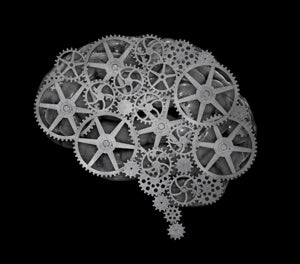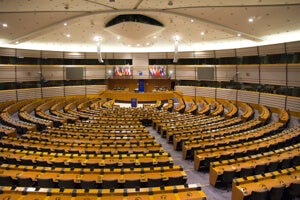Think your deliberate, guiding, conscious thoughts are in charge of your actions?
Think again.
In a provocative new paper in Behavioral and Brain Sciences, a team led by Dr. Ezequiel Morsella at San Francisco State University came to a startling conclusion: consciousness is no more than a passive machine running one simple algorithm — to serve up what’s already been decided, and take credit for the decision.
 Rather than a sage conductor, it’s just a tiny part of what happens in the brain that makes us “aware.” All the real work goes on under the hood — in our unconscious minds.
Rather than a sage conductor, it’s just a tiny part of what happens in the brain that makes us “aware.” All the real work goes on under the hood — in our unconscious minds.
The Passive Frame Theory, as Morsella calls it, is based on decades of experimental data observing how people perceive and generate motor responses to odors. It’s not about perception (“I smell a skunk”), but about response (running from a skunk). The key to cracking what consciousness does in the brain is to work backwards from an observable physical action, explains Morsella in his paper.
If this isn’t your idea of “consciousness,” you’re not alone.
Traditionally, theorists tried to tackle the enigmatic beast by looking at higher levels of human consciousness, for example, self-consciousness — the knowledge that you exist — or theory of mind — that you and others have differing beliefs, intents, desires and perspectives. While fascinating on a philosophical level, this approach is far too complex to explain on a fundamental level what consciousness is for.
Instead, Morsella believes that studying basic consciousness — the awareness of a color, an urge, a sharp pain — is what will lead to a breakthrough.
“If a creature has an experience of any kind — something it is like to be that creature — then it has this form of consciousness,” Morsella said in an email to Singularity Hub. It doesn’t have to be high-level, and “ it’s unlikely to be unique to humans.”
The Passive Frame Theory goes like this: nearly all the decisions and thoughts that need to be made throughout the day are performed by many parts of the unconscious brain, well below our level of awareness.
 When the time comes to physically act on a decision, various unconscious processes deliver their opinions to a central “hub,” like voters congregating at town hall. The hub listens in on the conversation, but doesn’t participate; all it does is provide a venue for differing opinions to integrate and decide on a final outcome. Once the unconscious makes a final decision on how to physically act (or react), the hub — consciousness — executes that work and then congratulates itself for figuring out a tough problem.
When the time comes to physically act on a decision, various unconscious processes deliver their opinions to a central “hub,” like voters congregating at town hall. The hub listens in on the conversation, but doesn’t participate; all it does is provide a venue for differing opinions to integrate and decide on a final outcome. Once the unconscious makes a final decision on how to physically act (or react), the hub — consciousness — executes that work and then congratulates itself for figuring out a tough problem.
In a way, the unconscious mind is like a group of talented ghostwriters working on a movie script for a celebrated screenwriter. If all goes smoothly, they bypass the screenwriter and deliver the final product straight to the next level. If, on the other hand, conflict arises — say the ghostwriters differ in their ideas on how the story should unfold — their argument may reach the ears of that famous screenwriter, who becomes aware of the problem, but nevertheless sits and waits for the writers to figure it all out. Once that happens, the screenwriter hands off the script, and gets all the credit.
Similar to the screenwriter, consciousness doesn’t debate or solve conflict in our heads; consciousness needs to be “on” in order to relay the final outcome — so it is essential — but it doesn’t participate in the nitty-gritty of decision-making.
Why did consciousness emerge in this way? Morsella thinks the answer is evolution.
Like all animals, humans try to conserve mental energy and automate our biological processes. Most of the time we run on instincts, reflexes and minute-to-minute immediate thoughts. Take breathing as an example — it’s completely automated, to the point that consciously trying to maintain a steady rhythm is surprisingly hard. In this case, conscious thought just bogs the process down.
Unlike most animals, however, humans gradually evolved into complex social beings capable of cultivating our intelligence for language and other higher faculties. Faced with increasingly difficult decisions on how to act, we suddenly needed a middleman to slow our unconscious mind down.
 Say you find yourself underwater; your instinct is to breathe, but better judgment — delivered by an unconscious cry of alarm (“don’t breathe!”) — tells you that you would drown. Your unconscious mind orders your consciousness to activate the muscles that will allow you to hold your breath and keep you alive. Consciousness triggers an adaptive motion.
Say you find yourself underwater; your instinct is to breathe, but better judgment — delivered by an unconscious cry of alarm (“don’t breathe!”) — tells you that you would drown. Your unconscious mind orders your consciousness to activate the muscles that will allow you to hold your breath and keep you alive. Consciousness triggers an adaptive motion.
The power of our unconscious mind doesn’t stop at basic bodily functions. In the paper, Morsella cites language — a high-level, complex and perhaps distinctively human faculty — as another product of the unconscious mind.
When you speak, you’re only consciously aware of a few words at a time, and that is only so you can direct the muscles around your mouth and tongue to form those words. What you’re saying is prescribed under the hood; your conscious mind is simply following a script.
Morsella acknowledges that his theory is unconventional and difficult to accept.
“The number one reason it’s taken so long to reach this conclusion is because people confuse what consciousness is for with what they think they use it for,” Morsella said in a press release accompanying his paper.
But none of this theory takes away our treasured qualities as sentient human beings — our imagination, our language, our sense of self and others — it just points to the unconscious mind as the main player on our brainy fields.
In fact, Morsella hopes his theory could lead to new ideas about intrusive thoughts or obsessions that often occur in mental disorders. “The passivity of consciousness explains why we are aware of urges and thoughts that are maladaptive,” Morsella said to Singularity Hub, because it doesn’t know that it shouldn’t be thinking about these thoughts.
“The system is less all-knowing and purposeful than we thought.”
Image Credit: Shutterstock.com



